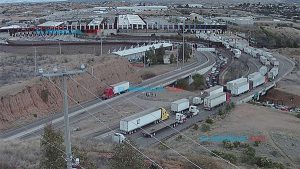Despite the positives, there are still hiccups at the Mariposa Port in Nogales, AZ.

Click here to see a live webcam of the Mariposa Port of Entry from ww.elimparcial.com
A new refrigerated area is not yet open, and this would be a welcome addition during the hottest summer months.
“As part of crossing from Mexico to the United States, agents perform random inspections,” said Miguel “Miky” Suarez, sales manager for MAS Melons & Grapes, LLC. “They empty the trucks, and while conducting the inspections, the unloaded produce has to be kept cool in 100-plus degree summers.”
High temperatures and perishables, of course, don’t mix. But there may be more help on the way.
Bobby Astengo, managing member of Peppers Plus, LLC, said, “There’s a group spearheaded by the Fresh Produce Association of the Americas (FPAA) looking into the feasibility of building additional cold rooms and enclosing the entire dock, so when inspections are being conducted, the cold chain isn’t broken.”
Mexican and American border officials are also streamlining processes by working together.
“Mexican customs also do random inspections,” Suarez said. “In the last three years, the two governments have collaborated to conduct inspections on the U.S. side, rather than both the United States and Mexico making the random inspections. It saves a lot of time because it’s not redundant.”
For Rodrigo Diaz, marketing director at Diazteca Company, a grower-shipper, distributor, and importer specializing in tropicals, a positive attitude makes a difference, too, during the border crossing process.
“The officials are kind, understanding, and considerate of the perishable nature of our product,” he said.
This is an excerpt from the most recent Produce Blueprints quarterly journal. Click here to read the full supplement.
Despite the positives, there are still hiccups at the Mariposa Port in Nogales, AZ.

Click here to see a live webcam of the Mariposa Port of Entry from ww.elimparcial.com
A new refrigerated area is not yet open, and this would be a welcome addition during the hottest summer months.
“As part of crossing from Mexico to the United States, agents perform random inspections,” said Miguel “Miky” Suarez, sales manager for MAS Melons & Grapes, LLC. “They empty the trucks, and while conducting the inspections, the unloaded produce has to be kept cool in 100-plus degree summers.”
High temperatures and perishables, of course, don’t mix. But there may be more help on the way.
Bobby Astengo, managing member of Peppers Plus, LLC, said, “There’s a group spearheaded by the Fresh Produce Association of the Americas (FPAA) looking into the feasibility of building additional cold rooms and enclosing the entire dock, so when inspections are being conducted, the cold chain isn’t broken.”
Mexican and American border officials are also streamlining processes by working together.
“Mexican customs also do random inspections,” Suarez said. “In the last three years, the two governments have collaborated to conduct inspections on the U.S. side, rather than both the United States and Mexico making the random inspections. It saves a lot of time because it’s not redundant.”
For Rodrigo Diaz, marketing director at Diazteca Company, a grower-shipper, distributor, and importer specializing in tropicals, a positive attitude makes a difference, too, during the border crossing process.
“The officials are kind, understanding, and considerate of the perishable nature of our product,” he said.
This is an excerpt from the most recent Produce Blueprints quarterly journal. Click here to read the full supplement.



